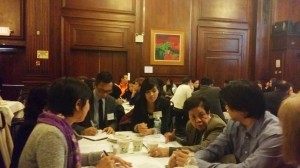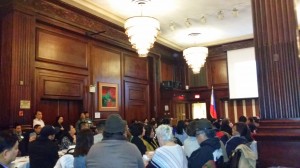Filipinos from 7 US cities hold successful assembly in NY

Breakout sessions at the general assembly hosted by the Philippine Consulate, New York. PHOTO BY DENNIS CLEMENTE
NEW YORK — It was a sight to see. Nearly a hundred Filipinos facing each other, holding pen and paper, doing away with staid formalities for something much larger and more important than the typical dinner-dance, sat down together February 17 to create Filipino community-building initiatives in the United States.
The event–billed as the first Filipino American General Assembly–brought in Filipinos from Delaware to New York and seven other cities in the dead of winter, on a weekend. The packed room consisted of young and old Filipinos, recent immigrants and young civic-minded Filipino Americans.
“This work plan offers us (the Consulate General) opportunities to work together with you,” said Consul General Mario de Leon whose hour-long talk was his longest since his return in this city in 2011 in his effort to involve Filipinos in community-building.
De Leon welcomed the audience as participants in an impromptu workshop based on the consulate’s three key principles–how to give back, increase visibility and assume leadership, and repurpose the community organization.
“We need to make ourselves count politically, economically and culturally as well as evolve and adapt for sustainability while also integrating second-generation (Filipino Americans) in leadership and activities,” he said in his friendly yet firm tone.
De Leon said he understood how Filipinos are so busy making a living, but not to the point where “we become invisible.”
He added how Filipino communities could also work together more effectively, considering the high attrition rate of folding organizations. When De Leon arrived in 2011, he said there were as many as 400 organizations, with only 80 now considered active, although 200 inactive ones are not counting themselves out.
He also asked if the older generation of Filipino were giving the younger generation of Filipino Americans opportunities to lead, if not integrate into their organizations.
“Are first-generation Filipinos and second-generation Filipino Americans talking to each other?” he asked, which was understandable given the tenuous link of the two generations. Even if first-generation Filipinos easily assimilate to the American way of life, that can be perceived as negative if it means not wanting to stick out or stand out.
There exists a culture gap with how the older generation may view Filipino community affairs as primarily social, like a dinner-dance affair, while the younger generation simply tolerate or frown upon this type of community activity. It’s a matter of perspective. De Leon asked if approaching a mayor is a photo op, or about actually talking to the mayor.
Breakout session
The impromptu workshop proved to be a lively affair that sparked healthy competition and a combo of camaraderie and outward sense of pride. Ten groups of five to seven people came up with suggestions to add to the consular office’s agenda for the year.
A few of these included giving awards to or funding entrepreneurs; promoting and supporting Filipino enterprise; producing a resource guide for newcomers to the US; using English names in some events to promote Filipinos in the mainstream; continue supporting Filipino seniors; and building a Filipino center for Filipino events.
For De Leon, it’s important that Filipinos become stakeholders. There may be disagreements on plans, but the most important thing is agreement with the outcome.
Other than New Yorkers, the other participants in the workshop came all the way from Connecticut, Delaware, Maine, Massachusettts, New Hampshire, New Jersey, Pennsylvania, Rhode Island and Vermont.
Many Filipinos are not aware of the consulate’s many outreach programs. It offers consular services, assistance to nationals, political actions, economic diplomacy, cultural activities and community-building events.
Flagship projects
One of many flagship projects included the Leadership Management Seminar last September. It hopes to arm community leaders with important tools that will help them better manage and lead their organizations.
Last year, it also had the Consulate General’s Geographic Warden System, a network of 56 Fil-Am volunteers in the 10 states under its jurisdiction. The mandate of the wardens is to help the Consulate attend to the Filipino nationals in distress.
Another community project was the Inuman at Pulutan (Taste of Philippines) event.
It also has the 16th Paaralan sa Konsulado (PSK) held every Saturday from June to August. The PSK, which was conceived in 1999 and marked its 16th year in 2014, exposed its 32 young participants to Philippine music, dance, martial arts, songs, poems, food and the Filipino language.
The Annual Tribute to the Philippines was held last July at Ocean City, NJ in partnership with the government of Ocean City and a number of Fil-Am community organizations there. Philippine crafts, food and dance were featured during the event under the “It’s more fun in the Philippines” theme.
The 7th Sinehan sa Summer was held last August at the Philippine Center where classic, short and independent films were screened. It was organized in partnership with Filipino organizations and with permissions for films from the Philippines provided by ABS-CBN, Kapatid 5 TV, Unitel Pictures, CineFilipino and the Film Development Council of the Philippines.
The Filipino-American History Month, proclaimed through a resolution passed by the US Congress in 2009, was marked by a series of activities.
These include the Outstanding Filipino-Americans in New York (TOFA) held at Carnegie Hall. Simbang Gabi was held last December at the Philippine Center. It was reinstituted after a hiatus of two years. Various Filipino community organizations organized each Simbang Gabi, consisting of a Holy Mass and salu-salo afterwards.
It’s actually possible to galvanize Filipinos to work together with better communication, according to the consular office.
For instance, the Fil-Am community, having inspired as well the mainstream community in the US northeast, was able to raise $374,410 net, without any overhead expense at all, enough to fund the building of 102 houses in the four villages affected by Typhoon Yolanda. As of this writing, the 34 houses in Hernani and 22 houses in Tanauan have been completed, while funds for another 22 houses for Giporlos have been remitted.
Email dennisclemente@yahoo.com Follow @dennisclemente
###
